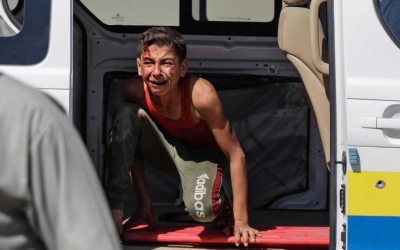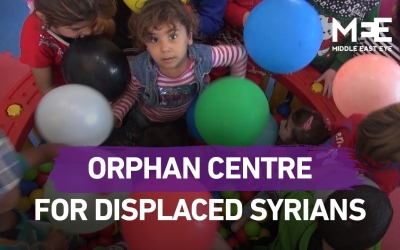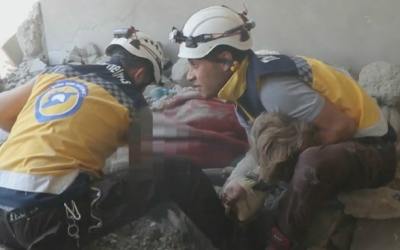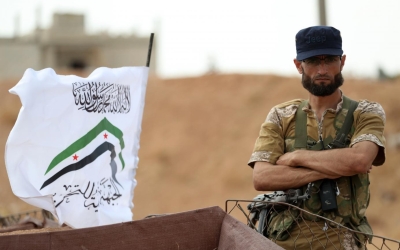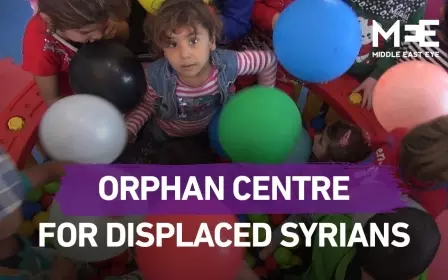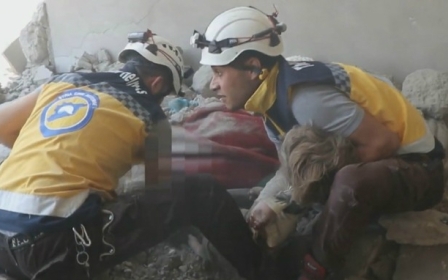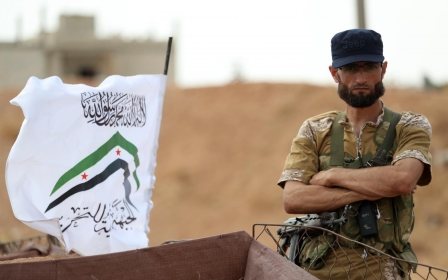'Everyone was scared': Artillery shells hit Idlib medical clinic registered on 'safe list'
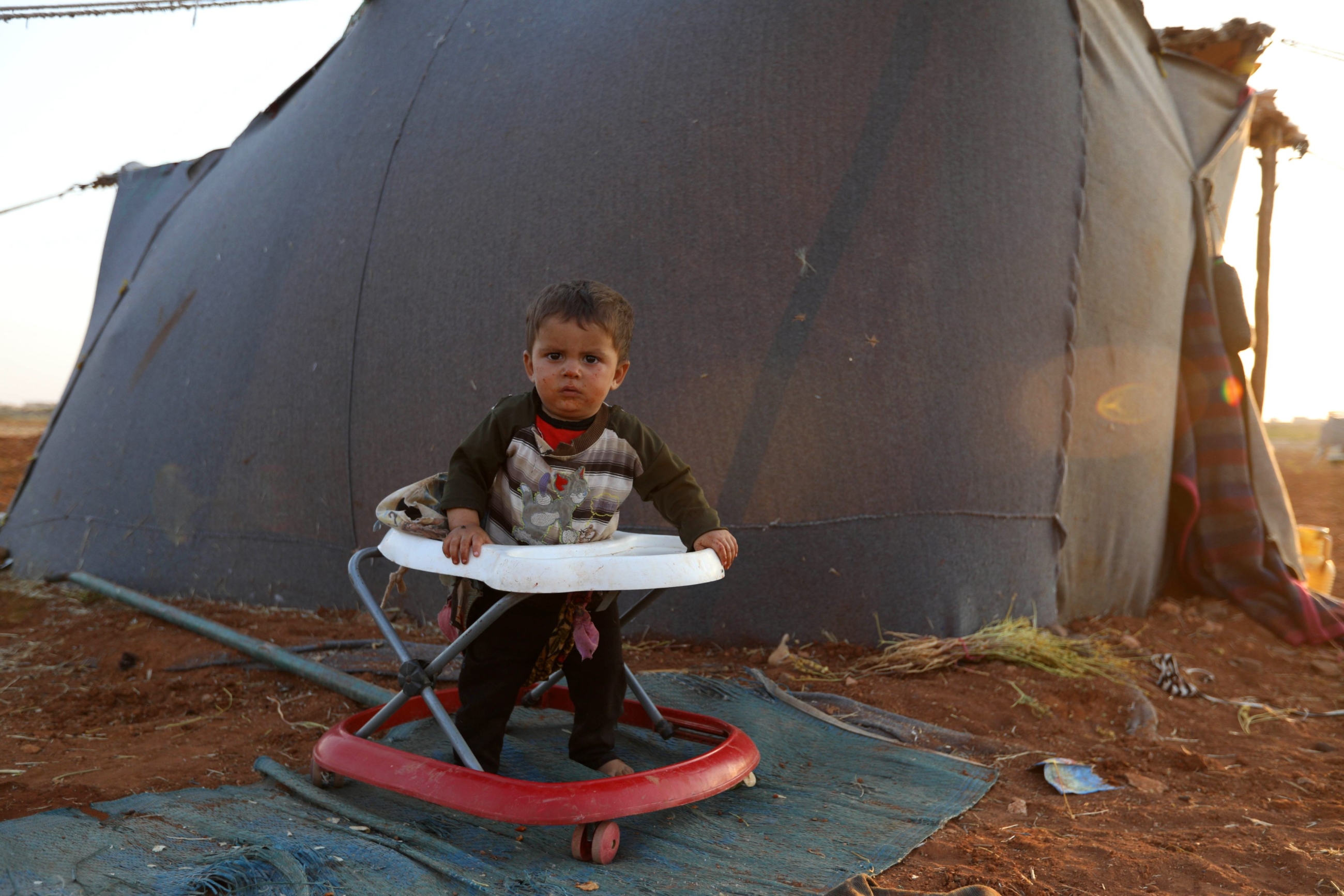
Mahmoud al-Murr heard piercing sounds in the distance, but he wasn’t yet sure what kind of bombs they might be.
He figured it had been around two years since a bomb had last hit the medical clinic he directs, and in Syria’s northwestern Idlib province, where Russian and Syrian forces are bombarding hospitals by the dozen, the chance of an attack was something he couldn’t ignore.
So he asked around. His colleagues seemed to agree: it was the sound of artillery fire. And, as they soon found out, it was directed towards the clinic.
At 12.15pm on Thursday, three of the shells hit, directly.
“There was dust and smoke and debris everywhere,” Murr recalled, speaking over the phone just hours after the attack.
Several other bombs hit the city, Maarat al-Numan in the southern part of Idlib province, during the attack, according to media activists living there.
Trails of blood snaked across the clinic’s tiled floor in photos shared by a local news page two hours after the bombing.
Boxes of medicine tumbled out of shelves and a thin layer of dust coated much of the furniture.
Medical staff and local journalists counted seven people injured, among them six of the dozens of patients who had been in the clinic when the bombs struck.
Mohammad al-Dhaher, the local journalist who took the photos, told another reporter of “massive damage” when he entered the clinic - which is funded by the UK-based organisation Save the Children - soon after the artillery attack.
'Dust. Blood. Crying. Shouting'
In one photo, a rescue worker from the Civil Defence carries away the clinic’s sole dentist, a splatter of blood on his white coat. He’s still wearing a pair of his semi-transparent disposable medical gloves.
Some 15 or so minutes earlier, Dr. Yussuf Hassan had been finishing up a root canal on a middle-aged woman.
She came into the clinic that morning complaining of unbearable tooth pain, Hassan later recalled, and hadn’t been able to sleep the night before.
One of the thousands of people in the city whose lives have been racked by bombs in recent months, she needed the free medical care.
But in an instant, an explosion shook the clinic’s dentistry room.
Hassan’s patient fell to the floor, alive, though her abdomen and chest were injured by flying debris.
He soon noticed his foot had also been pierced through by debris, and was bleeding heavily.
Hassan tore his shoes off, he recalls, and wrapped his socks around the wound. It would have to do. An emergency rescue team wouldn’t arrive for another 10 or 15 minutes.
Still in shock hours later, the 24-year-old spoke in short messages, one after the other.
“Everyone was scared. Dust. Blood. Crying. Shouting,” he said.
He sat in his home on Thursday evening recuperating with stitches and a cast around the injured foot.
He expects he’ll be recovering at home for a month before he is able to get back to work, a situation that upsets him.
In this corner of bombed-out southern Idlib province, some 300,000 people rely on the Maarat al-Numan clinic for free healthcare, according to medical staff who spoke with Middle East Eye.
Hassan estimates he’s the only dentist for miles. “I just hope I get better so I can treat them again,” he said.
'Deconfliction' list
As civilians, the clinic’s staff can do little to protect themselves and their patients from the bombs.
Several years ago, the clinic did try one strategy. The Maarat al-Numan facility is one of the dozens of hospitals and clinics across opposition-held northwestern Syria that voluntarily sent their location coordinates to the United Nations as part of a “deconfliction” list shared with warring parties.
The list was intended to prevent medical facilities like the one in Maarat al-Numan from coming under attack.
Both Murr, the clinic’s director, and a medical source with knowledge of the clinic, confirmed to MEE that the facility had shared its coordinates as part of the UN’s no-strike mechanism.
The medical source spoke on condition of anonymity to protect relatives living in government-held areas of Syria.
But the deconfliction list was shared, among other warring parties, with Russia - a key ally of the Syrian government, and one accused of carrying out deadly recent attacks over Idlib province.
'Medical centres will continue to be bombed'
Thursday’s attack is only the latest in a series of air strikes and artillery fire to directly hit hospitals, clinics and ambulances across the rebel-held northwest, including those that were supposedly deconflicted.
Some have only suffered minor damage. Others have been reduced to piles of debris, their doctors and nurses now long gone, and their equipment buried beneath layers of concrete.
In all, more than 50 facilities have been damaged by bombardment, the UN estimates.
Russia has denied many of the attacks, while the Syrian government asserts that its offensive on Idlib is against “terrorists”.
And though the UN announced last month it would launch an investigation into the hospital bombings, it remains unclear what, if anything, may actually come of it.
Those in Idlib’s healthcare sector expressed doubt that the attacks would halt at all.
“The medical centres will continue to be bombed,” the medical source said over the phone after Thursday’s bombing, exasperated. “Nobody will hold the government accountable.”
An empty waiting room
Bombings like the medical clinic attack have found a morbid rhythm in Maarat al-Numan.
In July, warplanes struck the city’s market as residents were streaming in for morning shopping. Dozens were killed. A massive crater hollowed out what had been a main road.
It was the deadliest attack since Syrian and Russian forces ramped up an aerial and artillery offensive on Idlib province in late April.
Idlib is an unsurprising target, for years the Syrian government has bussed opposition fighters and everyday residents to the province from elsewhere, as it seizes pocket after pocket of former rebel-held territory in a war it is now close to winning.
Now, only Idlib remains of that territory. Its population has swelled to an estimated three million people, a melting pot of rural Damascenes and former residents of Daraa, Homs and elsewhere, as well as the hardline Islamist fighters who now control much of Idlib.
All have been under the deadly barrage of air strikes and artillery fire since April.
A ceasefire announced by Russia in late August has done little to actually halt the bombing. Instead, the artillery fire simply continues.
By the UN’s latest count, more than 1,000 people have been killed in the months-long onslaught.
Hundreds of thousands more have fled their homes, displaced further north to Syria’s border areas with Turkey. They live in rented homes, threadbare tents or simply out in the open under olive trees, with little medical care or other services.
Those who do remain under the heaviest concentration of bombardment in southern Idlib now bear life with a bombed-out health sector.
'Thanks to God, the attack has stopped for now'
Save the Children estimates some 200 patients once visited the Maarat al-Numan facility daily.
But the waiting room remained empty on Friday morning, the pharmacy in disarray.
Solar energy panels that provided power for the clinic were unusable, according to Murr. Hassan’s dental chair sat wrecked in the damage.
By Friday afternoon, workers had mopped away the blood from the floor, said Murr, who had returned to the clinic. They cleared the dust and debris and coated the clinic.
Though “optimistic,” he remained worried for the clinic’s thousands of patients, who may now have to travel outside the city for care.
And though all those inside the clinic at the time of Thursday’s attack reportedly survived, the facility is likely to remain closed temporarily.
Murr predicts repairs could take up to 10 days.
One of the victims of Thursday's attack is in critical condition, Save the Children said in a statement.
"Yet again, civilians are paying the price of a long, deadly conflict. This facility was offering critical help to hundreds of men, women and children," said the organisation's spokesperson Amjad Yamin.
“Thanks to God, the attack has stopped for now, so that makes us more fortunate than some others,” said Samira, who monitors malnutrition cases in the clinic and requested a pseudonym to protect her identity.
She had been weighing a child at the time of the bombing Thursday.
“There were people who came to this clinic [because it seemed] like a safe place,” she said by phone.
“Now there’s a sense of frustration, of despair.”
Middle East Eye propose une couverture et une analyse indépendantes et incomparables du Moyen-Orient, de l’Afrique du Nord et d’autres régions du monde. Pour en savoir plus sur la reprise de ce contenu et les frais qui s’appliquent, veuillez remplir ce formulaire [en anglais]. Pour en savoir plus sur MEE, cliquez ici [en anglais].


